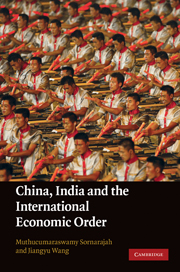Book contents
- Frontmatter
- Contents
- Notes on contributors
- Preface
- Introduction and overview
- PART I China, India and the global trade system
- PART II China, India and regional economic integration in Asia
- PART III Law and development in China and India: Domestic issues
- 14 Law and development in China and India
- 15 The development of modern corporate governance in China and India
- 16 An institutional race
- Index
- References
16 - An institutional race
A comparative study of the competition law regimes in India and China
from PART III - Law and development in China and India: Domestic issues
Published online by Cambridge University Press: 03 May 2011
- Frontmatter
- Contents
- Notes on contributors
- Preface
- Introduction and overview
- PART I China, India and the global trade system
- PART II China, India and regional economic integration in Asia
- PART III Law and development in China and India: Domestic issues
- 14 Law and development in China and India
- 15 The development of modern corporate governance in China and India
- 16 An institutional race
- Index
- References
Summary
The rise of China and India in the twenty-first century has attracted a great deal of international attention. Even in his recent State of the Union Address, President Bush of the United States specifically named India and China as the strong challengers to the American competitiveness in the world economy. Indeed, the two nations share many similarities, such as being giant developing countries with long glorious civilizations and colonial histories; but at the same time they have equally many differences, particularly on their completely different political, social and legal systems.
Despite the sharp discrepancies, the unsettled territory dispute and the recent international political uneasiness, the tide of globalization has more and more rung the two giants on the arena of international competition. The trade between China and India between 2000 and 2004 rose by more than 350 percent to record nearly US$14 billion and the governments' joint efforts are expected to push the trading volume to reach US$20 billion in 2008 and US$30 billion in 2010. The two countries have also agreed in 2006 to set up six joint task forces to explore the feasibility of a China–India Regional Trade Agreement. In the course of trade development, the concerns with the competition of the two countries have also been raised. For example, in the period of 1995–June 2005, India initiated 412 anti-dumping petitions, of which 81 were made against imports from China. Since 2000, China has also initiated at least two anti-dumping investigations against products from India.
- Type
- Chapter
- Information
- China, India and the International Economic Order , pp. 577 - 616Publisher: Cambridge University PressPrint publication year: 2010



